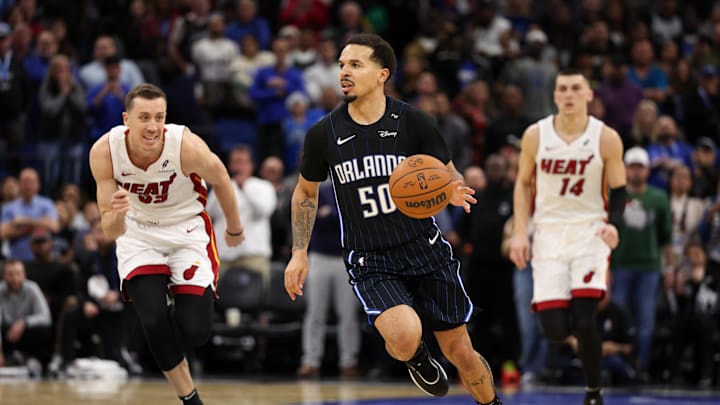No Jimmy Butler, shooting slumps, second night of a back-to-back, none of that can be used to excuse Saturday’s disastrous loss. After winning four straight games, the Miami Heat have now dropped their last three, prompting questions about the direction of the season.
Against the Orlando Magic at Kia Center, the Heat led by 20 at halftime and entered the fourth quarter up 22. Even without Butler, who was sidelined with a stomach illness, the Heat scored 76 points in the first half. It was their highest-scoring half of the season as they made 62.2% of their field goals.
That offense dried up in the fourth quarter. The Heat scored only three points in the first 9:17 of the fourth quarter and the Magic went on a 26-3 run to take the lead with 2:43 left to play. The Heat never recovered. They lost the period 37-8.
That 29-point margin is tied for the most the Heat has lost a quarter by in franchise history (it last happened in a Dec. 17, 1991 loss to the Cleveland Cavaliers, according to the Miami Herald).
“These are tough-ass lessons to complete a game,” coach Erik Spoelstra said.
The Heat need a plan for how they can reopen their championship window.
It might be tempting to throw away the game as a one-off disaster or a symptom of the modern, 3-point-heaving NBA where no lead is safe. That would be a mistake.
Twenty-six games into the season, the Heat have shown us who they are: Mediocre.
Every loss has an excuse or a reason. Good teams minimize those. The Boston Celtics have won games without their best players. The Cleveland Cavaliers have won games when the 3-point math doesn’t work to their advantage. The Oklahoma City Thunder can win games on the road with a rest disadvantage. More often than not, good teams find a way.
Heat fans might be tempted to dismiss the regular season’s importance or point to wins against the Cavaliers and Dallas Mavericks as proof that this team is capable of more.
While the regular season does not determine the NBA champion, it offers a window into what a team can do.
Highs can be fool’s gold. The lows matter just as much. The best teams don’t have the highest ceilings – they have the highest floors. The Heat have shown time and time again that their worst nights aren’t good enough.
Losses like Saturday’s in Orlando, or Monday’s in Detroit, or a Dec. 1 loss in Toronto or an opening-night blowout at the hands of the Magic are why the Heat can’t seem to climb more than a couple of games over .500.
They can make the playoffs, maybe even avoid the play-in, but so what?
The Heat aren’t as good as the Celtics or Cavaliers. They aren’t as good as the New York Knicks or Magic. They probably wouldn’t beat the Milwaukee Bucks in a seven-game series, either.
The Heat are at a crossroads.
Is there a trade out there that could provide an instant boost, or do the Heat have to start prioritizing their future?
Would trading for Zach LaVine, Brandon Ingram, Nikola Vucevic or Cam Johnson elevate the Heat to a higher tier?
Does the noise about trading Jimmy Butler grow louder?
After all, the Heat won’t win a championship this season with Butler on this roster, and Butler won’t win a championship with this supporting cast.
Trading Butler to a true contender out West might be the only way for both team and player to reopen a championship window.
For Butler at 35, a trade to the Golden State Warriors, Denver Nuggets, Phoenix Suns or Houston Rockets could be one last push.
For the Heat, it would offer a chance to reboot around Bam Adebayo and Tyler Herro.
Of course, the Heat could simply play the season out and wait for the summer to make tough decisions. But this franchise should understand more than most the importance of timing. Everything in the NBA is fleeting. Markets change, players get older, teams become less desperate. If there’s a strong market for Butler now, then the Heat need to strike while the iron is hot because that same market won’t be there in six months.
There are two choices: Make dramatic changes to the roster around Butler, or trade him.
The Heat aren’t good enough, and the front office cannot sit idly by and watch as their rivals grow stronger. This plan doesn’t work anymore. It’s time for a new one.
